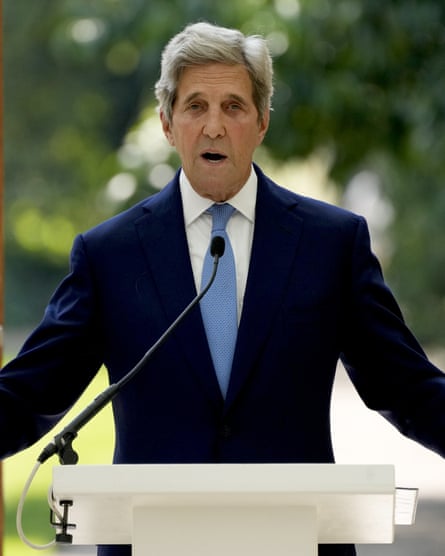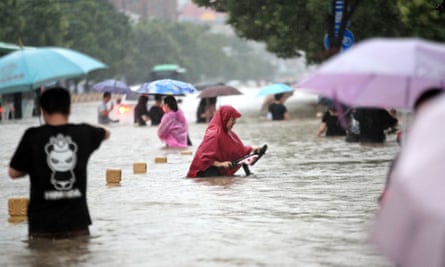Alok Sharma stepped off the plane from Brazil on Friday, the latest stop in a punishing travel schedule that has taken him to 30 countries in seven months, and into the eye of a media storm.
“The height of hypocrisy,” screamed the Daily Mail’s headline, slamming the UK president-designate of the Cop26 UN climate talks, to be hosted in Glasgow in October and November. Sharma’s crime? No quarantines, having taken advantage of the rare exemptions offered to ministers, and 200,000 air miles in the pursuit of climate diplomacy.
The attacks were “froth, cheap shots and trivialising”, in the words of Tom Burke, veteran government adviser and co-founder of the E3G green thinktank. “Alok Sharma is doing a reasonable job. He needs to see people face to face, it’s the only way to do successful climate diplomacy.”

To overseas observers, the furore was almost incomprehensible. “This is absurd criticism,” said Paul Bledsoe, a former Clinton White House climate adviser, now a Washington DC analyst. “Sharma is urgently trying to prevent global climate destabilisation, not taking holidays for pleasure.”
The hostile headlines were just the latest in a battle that has made the Cop26 team seem gaffe-prone and bumbling. Allegra Stratton, the prime minister’s press spokesperson for the talks, raised eyebrows last week when she admitted she would stick to her diesel car, rather than go electric. She also appeared to suggest people could join the Green party to fight the climate crisis, and well-meaning advice to save resources by not rinsing dishes and freezing leftover bread drew more ridicule.
More seriously, diplomatic observers cringed when John Kerry, climate envoy to US President Joe Biden, gave a major speech at the Royal Botanic Gardens, Kew – to an audience lacking any government top brass. Kerry pointedly heaped praise and bonhomie instead on the Labour mayor of London, Sadiq Khan, and Ed Miliband, the shadow business secretary, in the front row where ministers would normally sit.
Yet these missteps are only superficial ripples. The government leaders around the world whose actions and goodwill will determine whether Cop26 succeeds or fails will be looking much deeper. “They want to see if they can trust Boris Johnson,” says Burke. “They want to know if they can do a deal.” Underneath the surface, Cop26 is progressing both much better and much worse than recent antics would suggest.

To his credit, Sharma has succeeded in focusing countries on preventing global temperatures from rising by more than 1.5C above pre-industrial levels, the threshold beyond which corals bleach, low-lying islands and coastal areas face inundation, and extreme weather takes hold. That may not seem much of an achievement – the 2015 Paris agreement binds countries to hold temperatures “well below” 2C, with an aspiration to keep to 1.5C – but the difference between 1.5C and 2C is crucial in preventing the world reaching potential “tipping points” that could make the climate emergency move even faster. “Every fraction of a degree matters,” the activist Greta Thunberg has repeatedly said.
Another success is that in the past year, most of the world’s major economies and emitters have adopted long-term targets of reaching net zero emissions by 2050 or soon after. This is needed to stop warming exceeding 1.5C.

But that is not enough. The climate responds to cumulative carbon dioxide levels, so if countries emit too much before 2050, the 1.5C threshold will be breached anyway. For that reason, it is vital that governments come to Cop26 with national plans – called nationally determined contributions (NDCs) – to drastically reduce carbon this decade. While the US, the EU and the UK have set out NDCs, some major economies have not, including China, the world’s biggest producer of carbon dioxide, India, and countries such as Japan, Russia, Australia and Brazil whose plans are inadequate.
Sharma’s frantic travel schedule is aimed at forging as wide a coalition as possible, to make the commitment to 1.5C irresistible. The UN talks demand consensus, so every country counts, no matter how small. But while he is jetting to global capitals, his fellow ministers show scant regard for the biggest diplomatic meeting on UK soil since the second world war.
Rishi Sunak, the chancellor of the exchequer, insisted on slashing overseas aid, a disastrous signal to developing countries desperate for the rich world to honour a pledge of $100bn a year to help them cut emissions and cope with the extreme weather. Boris Johnson has failed to make an impact, devoting more time at the G7 to rows over sausages than climate diplomacy, while hailing Margaret Thatcher for closing coalmines. And foreign secretary Dominic Raab has been almost silent.
At home, the UK’s performance has dismayed green experts: the green homes grant was scrapped; the 2030 deadline for phasing out fossil-fuel cars has been attacked; the net zero strategy, heat and buildings strategy, and hydrogen strategy are all delayed; incentives for electric cars slashed; and ministers appear set on pressing ahead with licensing new oil and gas fields.
Rachel Kennerley, international climate campaigner at Friends of the Earth, told the Observer: “We’re not idly sleepwalking into climate and ecological breakdown, we’re sprinting into it. We don’t need any more of the prime minister’s half-measures and empty rhetoric. The government must stop pouring support into climate-wrecking projects, by withdrawing $1bn for a gas megaproject in Mozambique and rejecting plans for a new oilfield off the coast of Shetland. Any less, and he’ll be the laughing stock at the UN climate talks.”
